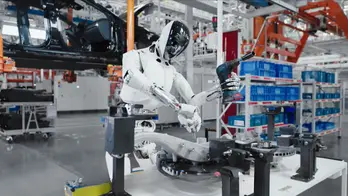Just as Americans saw the internet as a harbinger of major change a quarter century ago, a majority today feel artificial intelligence will have a big effect on society. But more so than the internet at the time, AI is seen by many as creating more problems than it solves, with misleading AI content and AI companies' impact on the economy both areas of concern.
AI's perceived impact on work looks especially mixed. More think AI will make jobs in their field easier than harder, but relatedly, Americans are likelier to see AI as decreasing than increasing the number of jobs available.
There are large differences by educational attainment, with college degree holders more likely than those without degrees to say it will make jobs easier in their field. That suggests that when it comes to the way people do their work, the public mainly sees AI impacting computer-based and white-collar jobs.
College grads are also likelier than those without college degrees to see the development of AI and AI companies as good for the economy. That said, the view that AI is more likely to reduce than increase the number of jobs is broad-based, spanning all levels of educational attainment.
Americans are quite mixed on AI's potential impact on the economy. On balance, they are more likely to see the development of AI and AI companies as being bad for the economy than good. This is a major difference in sentiment from the early internet years. In CBS News polling done in 1999, seven in 10 felt the "rapid growth in the number of internet companies" was good for the economy. Notably, Americans are also much less optimistic than AI experts, particularly on the potential benefits of the technology for work and the economy.
What can AI do better?
There are some things most Americans agree AI can already do better than a human. That list includes finding things on the internet, correcting writing and grammar, and analyzing data — all tasks that tend to be structured, and perhaps even tedious for many people.
The list of things people feel AI does worse than humans is wide-ranging and instructive. Some lean more on interpersonal skills, like providing customer service. Some involve creativity, like creating art, which AI is seen as worse at by a wide margin. The other items may be seen as more dependent on judgment and involving higher stakes. These include medical diagnoses, financial decisions and the item on which the largest majority say AI is worse: driving a car.
People are very mixed on whether AI can produce accurate information better than humans can today. And whether it can or not, half of Americans are very concerned about AI being used to create false or misleading pictures, information, and videos. Nine in 10 are at least somewhat concerned about it.
And though a slim majority feel they can tell the difference between AI- and human-produced things at least somewhat well, few say they can do so very well. Among people who don't use AI themselves — a category most Americans are in — most don't feel they can distinguish even somewhat well.
Public understanding and personal use of AI
Two-thirds feel they have a good understanding of AI. That matches the levels seen in our 1999 polling on the internet, and we see similar demographic breaks now as we did then. Americans today are much likelier to say their understanding is somewhat good than very good, suggesting room for it to grow in the coming years.
There are stark divides in AI understanding and use by age. Eight in 10 Americans under the age of 45 feel they have a good understanding, while that number falls to only about half of Americans 65 and older. College degree holders report higher levels of than other Americans, as do men relative to women. Men are also more positive than women on AI's economic impact.
Most don't feel it's necessary to use AI these days to keep up with the times. Four in 10 say they personally use AI, and those who do are likelier to say it's for personal use than for work. The few who use it mostly for work report greater understanding of AI and tend to feel it will make jobs in their field easier to do.
The share who say people must use AI to keep up is close to the four in 10 who said so about the internet in 1999. And as was the case back then, early adopters skew young and male. And younger people are more likely to say they use AI for work purposes.
Six in 10 say artificial intelligence will have a bigger effect on society than the internet did. That is significant, as the internet itself was seen as bringing about big change in its early years. In 1999, Gallup polling found that most Americans felt it was going to change society more than the introduction of the telephone and television.
This CBS News/YouGov survey was conducted with a nationally representative sample of 2,351 U.S. adults interviewed between March 24-26, 2025. The sample was weighted to be representative of adults nationwide according to gender, age, race, and education, based on the U.S. Census American Community Survey and Current Population Survey, as well as 2024 presidential vote. The margin of error is ±2.5 points.
Toplines
cbsnews_20250327_3 by CBSNews.com on Scribd







